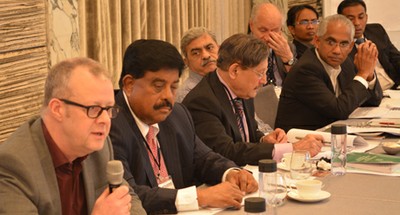ASIA: Opening statement by the Chairperson Mr. John Clancey, of the 2nd Asian Alliance Against Torture and Ill-treatment, 11-13 November, 2013, Hong Kong’
As we begin this second meeting let us start with a short reflection on the overall aims of the project to promote the Convention Against Torture (“CAT”) and our progress in working to prevent torture in Asia. In this regard, there have been some historically important achievements this year in the Asian region.
The adoption of a law criminalising torture in Bangladesh naturally should receive the pride of place. During our last meeting we learned that there was skepticism about the success of the private member’s bill for criminalising torture which was then before the Bangladeshi parliament. However, as we meet now this bill is already a law passed without any opposition. The title of the new law is the Torture and Custodial Death (Prevention) Act, 2013. It was passed on October 24, 2013.
The passing of this law has an interesting background, which is very relevant to us as we are persons who have taken a voluntary interest in the task of eliminating torture from our countries. The initiative for the new law in Bangladesh and all the work that went into promoting this legislation came from voluntary efforts. Mr. Saber Hossain Chowdhury, an MP from Bangladesh, contacted the Asian Human Rights Commission with a request that we assist to draft a bill criminalizing torture that could be placed before parliament. The Asian Human Rights Commission immediately took the initiative to draft the bill and made it available to this enthusiastic parliamentarian. He placed the bill as a private member’s bill. He also took numerous steps for internal lobbying, as well as external advocacy to bring the bill to the attention of the government. The prime minister later placed the bill before a select committee, which thoroughly discussed the issue and after making some amendments recommended that the bill be placed for debate. Meanwhile the Asian Human Rights Commission carried on with parallel promotional work and soon several civil society organizations in Bangladesh joined in. Of these local organizations, Odikar, which was also represented at our first meeting, deserves special mention for their efforts in promoting this legislation. What comes next for Bangladesh will be discussed later in this speech, together with the challenges faced in other countries. Suffice to say that at the moment, Hong Kong, Sri Lanka, the Philippines and Bangladesh are the only places in Asia, which have legislation criminalizing torture.
There have also been encouraging developments elsewhere. For example, in Pakistan a prepared bill has now been placed before a former judge for review after which it will be presented to parliament. This initiative in Pakistan also demonstrates what volunteers, including civil society organizations, can achieve in promoting legislation on human rights issues. Within the short period of two years a large number of human rights organisations responded to the call by the Asian Human Rights Commission to draft legislation criminalizing torture. These organisations formed themselves into a lobby and are presently engaged in advocacy to promote the adoption of this law. They were able to convince both of Pakistan’s leading political parties to give priority to the passage of this law. Several ministers of the former, as well as the present, government as well as other parliamentarians have supported this call from civil society organizations. The bill is currently being discussed in parliament. We hope that when we meet next year we will be able to report that Pakistan has also adopted a law against torture.
In both Nepal and India bills criminalizing torture have already been placed before their respective parliaments. There are important civil society lobby groups pressing for the adoption of these laws. The Asian Human Rights Commission has contributed to the promotion of these bills in both countries.
While we note these extremely significant achievements, we must also recognize some of the central problems obstructing the efforts to eliminate torture. Some skeptics even go to the extent of saying that while laws are passed, the actual implementation of those laws will never happen. While we would like to dismiss such skepticism, it is quite sensible on our part to take a look at the actual situation and the seeming absence of political will on the part of many governments to take the requisite steps to eliminate torture even though these governments condemn torture and ill-treatment as inhumane practices unbecoming of any decent nation.
Continued at:
http://www.humanrights.asia/news/ahrc-news/AHRC-STM-209-2013
# # #
About AHRC: The Asian Human Rights Commission is a regional non-governmental organisation that monitors human rights in Asia, documents violations and advocates for justice and institutional reform to ensure the protection and promotion of these rights. The Hong Kong-based group was founded in 1984.










